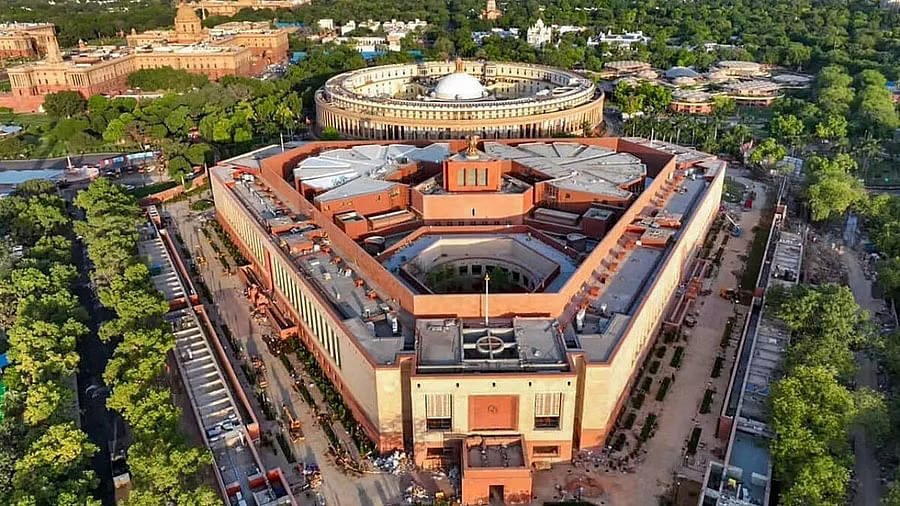
New parliament building.
Credit: PTI Photo
Recently, while dismissing a petition seeking criminal action against former Haryana MLA Rao Narbir Singh for providing false information about his educational background in his nomination papers, Justice Mahabir Singh Sindhu of the Punjab & Haryana High Court observed that there was still no requirement for educational qualifications to become a cabinet minister, a member of parliament, or a member of the legislative assembly, despite the passage of time.
Providing context, he recalled that Independent India’s first President, Dr Rajendra Prasad, expressed two regrets on November 26, 1949, before adopting the Constitution of India. One was the absence of qualifications for members of the legislature, and the other was the inability to draft the Constitution in an Indian language. He said he would have liked to have some qualifications laid down for members of the legislatures. “The difficulties in both cases were practical and proved insurmountable. But that does not make the regret any the less poignant,” Justice Sindhu quoted Rajendra Prasad. He added, “A period of about 75 years has been consumed; but till date, the ‘first regret’ is waiting for amelioration. To this day, there is no requirement of any educational qualification for becoming a Cabinet Minister, Member of Parliament (MP), and/or Member of Legislative Assembly (MLA) in our country,” expressing the court’s disappointment.
“Is it the law’s flaw and/or pure politics? Or both of the above? But it is very difficult to comprehend for a commoner,” the court commented. In India, most government jobs require certain prerequisites, such as age and education. So why are lawmakers (MPs and MLAs) exempt from the education requirement? I have pondered this question for some time and am glad that Justice Mahabir Singh Sindhu of Punjab & Haryana HC has brought it up.
There are some qualifications to become a minister in India: one must be a citizen of India, a member of parliament, at least 30 years old for the Rajya Sabha or 25 years old for the Lok Sabha, and registered as an elector for a parliamentary constituency. The Constitution does not specify any minimum educational qualification, likely because the framers were aware of the country’s low literacy rate at the time, which was about 12%. Even the Representation of Peoples Act, 1951, does not address this issue.
The victorious candidates from the 2024 Lok Sabha elections come from diverse educational backgrounds. According to a report by the poll rights body, the Association of Democratic Reforms (ADR), of 105, or 19% of the winning candidates, two had studied up to class 5, four up to class 8, 34 up to class 10, and 65 up to class 12, while 420, or 77%, reported having a graduate degree or higher. According to the ADR report, one winner was “just literate,” and seventeen winning candidates were diploma holders.
Lawmakers have primarily four functions:
(i) →scrutinise every piece of legislation that is introduced both in the house and in standing committees;
(ii)→oversee the functioning of the government of India;
(iii)→debate the budget and demands for grants; and
(iv)→represent the concerns of their constituents in parliament.
Thus, lawmakers must carefully review each bill presented in the House, analyse its content, clearly identify the problem it aims to solve, and assess whether the proposed solution aligns with the intended goal. They must also scrutinise each section of the bill, examine potential unintended consequences, check for alignment with existing laws, constitutional provisions, and potential conflicts with other statutes. He should consider the potential social, economic, and environmental effects of the bill, including its impact on different demographics, and evaluate whether the proposed measures are practical to implement and enforce, considering administrative capacity and resource availability. In addition, ministers have to speak with foreign delegates to provide better opportunities or facilities in their respected portfolio. In such a scenario, how can a lawmaker without sufficient education and oratory skills review the bills and take part in debates?
Lack of discussion and debate on significant bills and laws in the Parliament results in the adoption of legislation that is riddled with loopholes and ambiguities, giving the government unrestricted power to enact any legislation it pleases without consulting anybody. Such laws not being clear to the courts creates a lot of litigation, inconvenience, and loss to the government as well as to the public, and as a result, people will get disenchanted with the parliamentary process as a whole.
In 2002, Pakistan introduced a bachelor’s degree or higher qualification for all candidates to contest elections for the lower house of parliament. In recent times, especially post-liberalisation, governance has become complex. It requires proficiency and specialisation for better governance. India’s literacy rate in 2022 was 77.7%. Keeping in view the strong need for minimum education as one of the qualifications for Indian lawmakers, the Representation of People’s Act must be changed to make minimum education mandatory for lawmakers.
One of the ironies in India is that the brilliant minds are controlled by the most foolish minds. May be since our independence, it could be the single transgression India has committed. The moot question is, when would we see educated lawmakers sitting in the parliament supporting one another and taking wise decisions?
(The writer is a retired Deputy Director of Boilers)